Analyze with AI
Get AI-powered insights from this Mad Devs tech article:
Mad Devs Customer University continues its series of publications about pricing strategies to help customers in the IT industry maximize benefits in their work with contractors. Here, we will address the issue that many customers are implicitly or explicitly concerned about: does it matter where your team of developers is from? If so, how will geography affect your work with the team? What regions to choose from?
First, it's important to stress that geography matters, but it's not the number-one factor. We want to take it off the table right away: you can find the right team for your project or organization anywhere on the globe. Modern communication technologies have made it possible to reach talents anywhere. Companies are shifting away from the traditional rule book when it comes to hiring and managing development teams, as the rise of remote work has forced many to rethink their approach. Working with a remote team can be very easy, as more data protection and distance work software have emerged.
Main criteria for choosing country
However, in some regions, you may be more likely to find a team that fits you in terms of approaches and culture. Things to consider include:
- Your own region
- What your project is about
- Your budget
- The risks you are ready to take
And one of the main points—don't overestimate the importance of your team's location. Let's elaborate on this.
Seniority level
Assumption: countries with higher dollar purchasing power charge lower prices. In fact, it's not always the case. Skills and experience are more important, and a high-rate developer from a developing country can cost as much as a high-rate developer from a developed country.
Why doesn't the developers' location play a major role in influencing the cost of the software? Is it fair to pay a developer from San Francisco the same amount as a developer from Vietnam?
They can deliver the same quality of work, so everything's fair.
Naturally, the towering leader in terms of senior developers' average salaries is the United States, but it in no way suggests that the work of developers from elsewhere will be necessarily cheaper or of poorer quality.
Too many factors shape average salary: taxes, cost of living, and income level, to name a few.
Conclusion: check the skills and experience ahead of the actual location or the legal address. (And if you still want to narrow down your search to the region, jump right into the middle of the article.)
Declared vs. actual location
An IT company may claim to be based in one country while having most of its actual developers, or all of them, working from another one. For example, many companies whose teams actually reside in Ukraine, Belarus, or Vietnam, which are among the most popular countries in terms of outsourcing development projects, have their headquarters in Western Europe. The headquarters may or may not have actual staff (e.g., admins, support, or sales managers may be physically present there), but all the developers normally work not from the headquarters.
These companies don't want to deceive you. They are usually completely frank about the locations from which their employees work; it's just they prefer to have an office in a developed country for legal reasons. For example, access to well-developed jurisdictions allows them to protect your, the customer's, legal interests.
Besides, some developers can simply prefer to travel as they work: this is known as the digital nomad trend. You may not even be aware of the fact that your contractor, who you think lives in one country, is actually working on your project from another one, on the other side of the globe.
If you really are interested in where the team you're working with is physically located (we'll talk below about why you might be), ask the contractor about it specifically and straightforwardly.
If your potential contractor is reluctant to talk about this, or if you find reviews claiming that this contractor lies to customers about their country of origin, it perhaps is a red flag.
Corporate policy on developers' location
Some IT companies operate locally and prefer hiring developers living in the same city and gathering them in one office. Other IT companies, acknowledging the opportunities that modern technology provides for remote work, hire people from anywhere. Such employers may completely ignore where their employees live as long as the employees fit the requirements for the position and pass the job interview.
This is why the contractor you choose to hire may have developers in different regions of the world. The Internet is full of job offers for remote tech specialists. Some employers specify regions they'd want their employees to live in (rather broadly, such as "Europe" or "the US"), mostly because of the time zone concerns, but often the field says simply "Anywhere."
This is a clear indication that the IT industry today does not revolve around regional considerations but is getting global instead. If you choose to work with a company that has good reviews and has done projects similar to yours, you may rest assured that they've made the geographical choices for you.
Corporate culture
Modern science unambiguously suggests that the concept of "national mentality" is at least misleading. Often, it is simply an incorrect way to describe reality. It is impossible to assert with any degree of certainty that any, say, Estonian person will work in one way, and any Bangladeshi person will work in a different way. IT businesses know that which is why they hire people not based on ethnicity or origin but based on attitude, responsibility, and professionalism—the truly revealing characteristics.
That is why it is wise to pay attention to the corporate policies and principles of your contractor instead of the demographics. If you want to check the company you want to outsource your work to, go to Glassdoor, Upwork, or other services where contractors get reviewed. See previous customers' feedback to understand how the company treats its clients. The reviews will tell you more about the corporate culture than the contractor's website. And they say more than the company's location for sure.
Cultural fit
Having just said that national mentality doesn't exist, we have to admit that culture does. Certain regions have been famous in the IT industry for having lots of contractors using very specific approaches to the work with customers—approaches that are thoroughly different from those in other regions of the world.
Now that popular misconceptions and simplifications are out of the way, we can finally move on to the meat of the matter: how are world regions differ in terms of software engineering contractors? Warning: the data below may contain traces of (or a lot of) generalization, and this should normally be kept in mind when one assesses potential contractors
Pros and cons of the world offshore regions
Now that popular misconceptions and simplifications are out of the way, we can finally move on to the meat of the matter: how are world regions differ in terms of software engineering contractors? Warning: the data below may contain traces of (or a lot of) generalization, and this should normally be kept in mind when one assesses potential contractors.
Middle East
The Middle East is a region that features countries that share various common factors such as their political history, ethnic groups, and religious beliefs. There are 18 countries in the region: Bahrain, Egypt, Cyprus, Iran, Iraq, Jordan, Kuwait, Israel, The Syrian Arab Republic, Oman, Yemen, Lebanon, Palestine, Qatar, Saudi Arabia, The United Arab Emirates and Turkey.
Pros
- Growing IT industry: the high competition means there are many teams eager to take on your project.
- Investment: many Middle East countries today invest heavily in IT and relevant education, which means that many young development specialists are becoming available in the region every year.
Cons
- Lack of experience: The digital sphere development in the region is recent, and this is why it may be hard to find experienced teams capable of handling complicated long-term projects.
- Legislation: apart from Israel, the UAE, and Qatar, which are developing extensively in terms of digital technologies, the region mostly has relatively poorly developed IT policies, and this can complicate settlement in terms of disputes.
Price
Price ranges are wide and do not constitute either a pro or a con. Israel, which is the most developed country in the region according to the UN criteria, predictably offers software development services at a rather high price: starting normally at 50 USD per hour and sometimes stretching to above 100 USD per hour.
In the UAE, the prices are humbler: normally around 50 USD per hour, and more often than in Israel below that. In the least developed country, Yemen, the standard range is 15 to 30 USD per hour. Consisting of countries with dramatically different life quality levels, the Middle East hardly features a single pricing model.
Continental Asia
The territory of Asia is so large that for convenience we will divide it into several regions. Here we are talking about East Asia (China, Japan, South and North Korea, and Mongolia), South Asia (India, Pakistan, Bangladesh, Afghanistan, Maldives, Bhutan, Nepal, and Sri Lanka).
Pros
- Large market to outsource to: Many Asian countries have a well-established culture and long-standing traditions of catering to the needs of overseas customers looking for software development services. Bonus: English is fairly widespread and widely spoken here.
- Availability: The world's two most populated countries—China and India—are in Asia, after all. The number of people offering their services is thus overwhelming.
- Price: There are many developers in Asian countries who will take on your project for the enticing 10 USD per hour or less. It may be suitable for rather small tasks, especially if those can hardly be screwed up.
Cons
- Search and choice: As pointed out above, the selection of contractors is vast, and finding the right one may be time-consuming.
- Notoriety: One of the paragraphs below elaborates on that. There's always a risk to come across a contractor that will let you down.
A different Asia
Central Asia (Kyrgyzstan, Tajikistan, Kazakhstan, Uzbekistan, and Turkmenistan)
India and China obviously dominate the market in the region, and, as it has been stressed, finding the right candidates there is challenging. But they are not the only ones offering economic benefits of outsourcing in Asia. What you may want to explore is the parts of Asia where the IT industry is recent and is in the active development stage. Central Asia, which is turning into a major IT outsourcing hub, is an example: not necessarily cheap, but getting more and more reliable in terms of performance and quality.
Southeast Asia + Australia
First of all, we need to note that the 11 countries that make up Southeast Asia are: Malaysia, Singapore, Thailand, Philippines, Brunei, Cambodia, Indonesia, Laos, Myanmar, East Timor, and Vietnam. And Indonesia is the largest and most populous country in Southeast Asia.
Pros
- Cost: Software development with Southeast Asian contractors is normally cheaper than it is with contractors from Continental Asia. The reason is that the IT industry is younger in the former region, so the governments support it with, e.g., lower taxes.
- English: In the Philippines, for example, English is one of the two official languages; similarly, in other countries of the region, general English proficiency is rather high.
- Positive reviews: Southeast Asian countries, particularly Thailand and Vietnam, have often made it to the recent years' ratings of the best countries to outsource software development to.
Cons
- Cost: If we talk about Australia or Singapore, the high-income countries of the region, the prices are rarely below 40 USD per hour and often above 100 USD per hour.
- Capabilities: In the parts of the region where the outsourced software development sector is young, it can be challenging to find contractors who will successfully run long-term, large-scale projects.
Africa
Pros
- Affordability: Only the continent's largest economies, Nigeria and South Africa, the latter especially, have relatively high prices: around 40 USD per hour and often more. In the rest of the countries, it's fairly simple to find services at a lower price.
- Growth: As many economies of Africa are skipping the industrial stage of development and go straight into the world of IT, a lot of young specialists are becoming available.
- Language: English is ubiquitous and good among contractors.
Cons
- Education: Africa, like all continents, surely has talented and skilled developers, but the educational system overall is not adjusted to constantly deliver specialists in large numbers.
- Bureaucracy and politics: If political instability made your contractors miss deadlines, you wouldn't like it, would you? Besides, the legislations of some African countries may not yet be very friendly towards overseas customers.
Latin America
Pros
- Cost: The prices are normally lower than in North America while the quality is comparable.
- Time: For customers from North America, it is convenient to work with Latin American contractors as they all live in the same or neighboring time zones.
- Culture: The nations of Latin America are culturally unique and diverse, but overall it may be easier culture- and communication-wise for customers from, say, North America and Europe to work with Latin Americans than, say, with Chinese developers.
Cons
- Cost: The prices somewhere in the region may be lower than in high-income countries, but it is still high: the normal range is 40 to 70 USD per hour.
- Taxes and regulations: The policies in the region are not as prepared to cater to the needs of overseas customers as they are in the countries that have been in the business for a long time.
- Discipline: It would be insulting and completely unfair to state that Latin America has a larger number of lazy developers than any other region of the world, but it has to be admitted that deadlines missed by Latin American contractors have been reported somewhat disproportionately often. It may be just a myth.
North America
Pros
- Quality: No surprises here. Some of the best countries to outsource software development are in this region. It is easier to find good contractors in North America than to find them elsewhere.
- Cultural fit: If you are in North America, and if cultural fit and mutual understanding are your priorities, your fellow citizens are your first choice.
Cons
- Cost: No surprises here, either. Be prepared to pay a lot if you're hiring contractors from some of the world's most successful and largest IT industries.
- Bias: If you presume that a contractor from Canada or the US will no doubt be right for you, you automatically lose the ability to assess them critically. Remember the rule? The location of the team is not the number-one factor.
Eastern Europe
Pros
- Price and quality: Eastern Europe has been a hit in terms of outsourcing software development for years. What companies from Poland, Ukraine, Russia, and other countries of the region have to offer high-quality services at moderate prices starting at 30 USD per hour.
Cons
- Time: For customers from the Americas, Eastern Europe may be hard to work with because of the time difference. However, an overlap in the working time of at least three hours can be sufficient for maintaining the continuity of work.
- Communication: English is common among IT people, but not perfect, and the cultural fit may not be complete.
Western Europe
Pros
- Quality: In this well-established IT industry, you are guaranteed to eventually find contractors who will deliver an immaculate product.
- Procedures: Western European companies are famous for the flawless business practices, including customer communications, and this is why it is less likely to come across an unfortunate contractor here than in most other regions.
Cons
- Cost: Labor is well-paid in Western Europe because of high standards of living and social security policies. Software development here is expensive: rarely below 50 USD per hour and often twice the amount or more.
- Selection: Western Europe is not full of developers who are ready to take on just about any project. If yours is a rather small one, it may be hard to find contractors in Western Europe right away.
We have looked at the regions, now we can go directly to specific countries. So, what is the best country to outsource software development?
Although the data may vary, most lists of the best places to outsource software development include multiple locations. Let's make a list of the best of the best in random order.
Top 10 outsourced countries
China
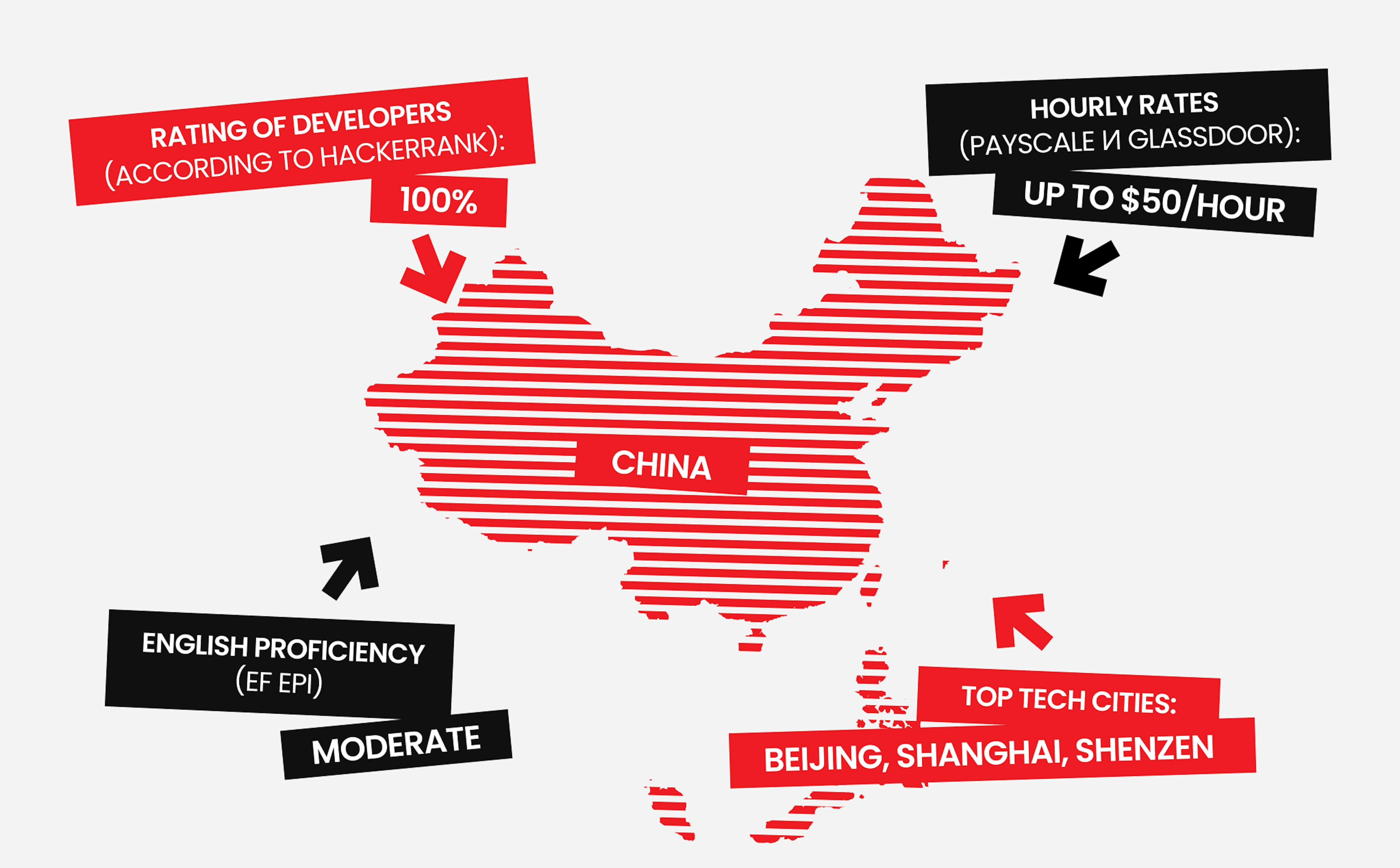
Various studies state that China is currently responsible for over 68% of the global outsourcing work. According to Statista: "In 2020, the market size of the Chinese service outsourcing industry amounted to approximately 175 billion U.S. dollars, representing an annual growth of over 10 percent." It is also expected to continue growing due to the country's low cost and steady growth. Some experts also predict that the outsourcing market in China will continue to evolve over time.
Local experts have the necessary skills to develop software products that are based on popular technologies such as Python and Shell. These include projects related to Big Data. The primary and secondary education sectors are mainly focused on high tech and mathematics.
Argentina
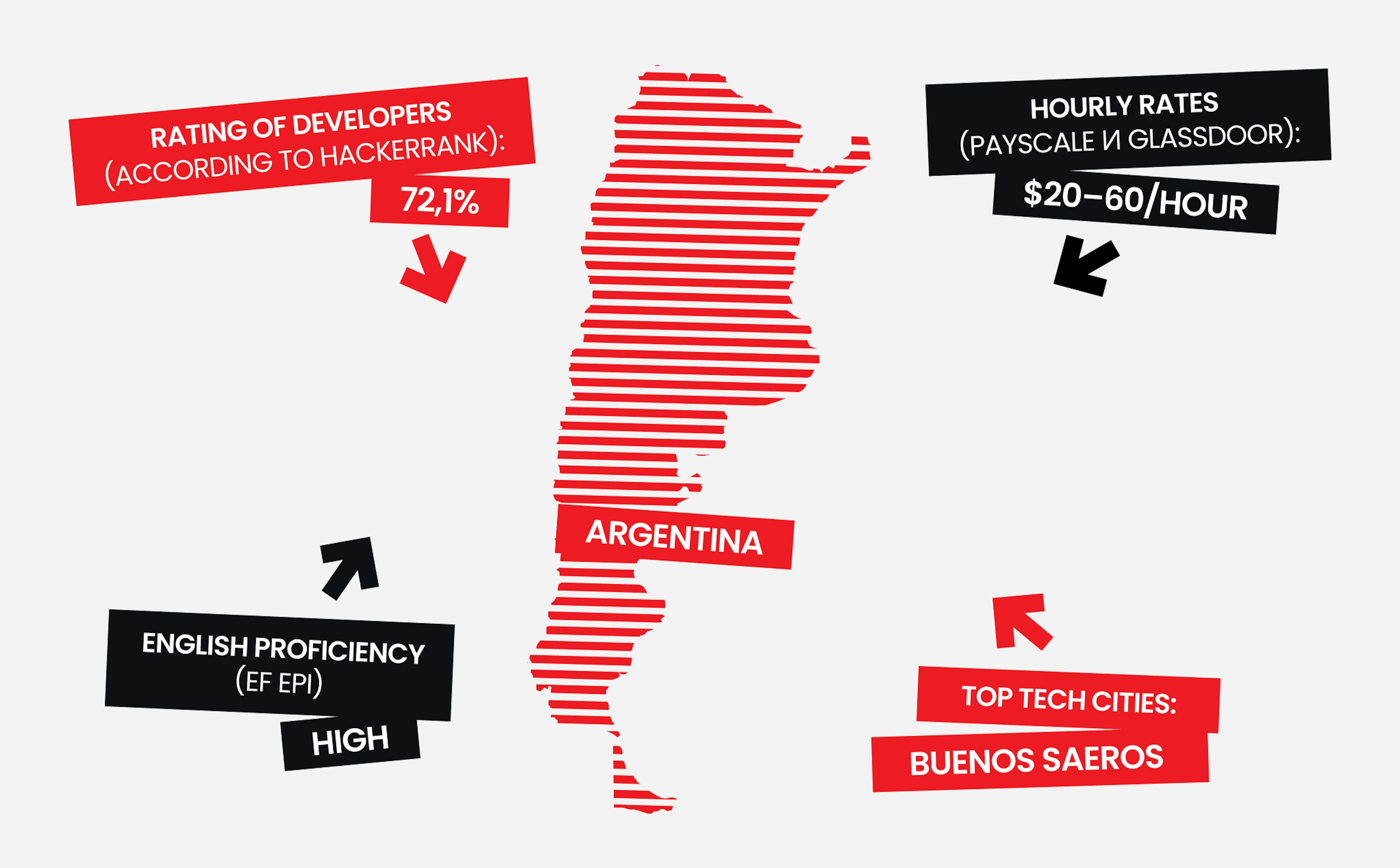
Most of the country's outsourcing companies are based in Argentina, and they have the necessary skills to handle complex projects such as data migration to the cloud and software development. Free education is also available in the country for those who are interested in learning more about computer technologies. Currently, over 70% of students are enrolled in university programs that are related to computer technologies.
Ukraine

The skills of local experts are mainly focused on developing software products that are based on artificial intelligence, blockchain, and Big Data. Many of these positions are also filled by senior developers. Aside from being able to develop software, individuals in Ukraine also have the necessary technical skills to learn programming languages such as C++, Java, and PHP.
Poland
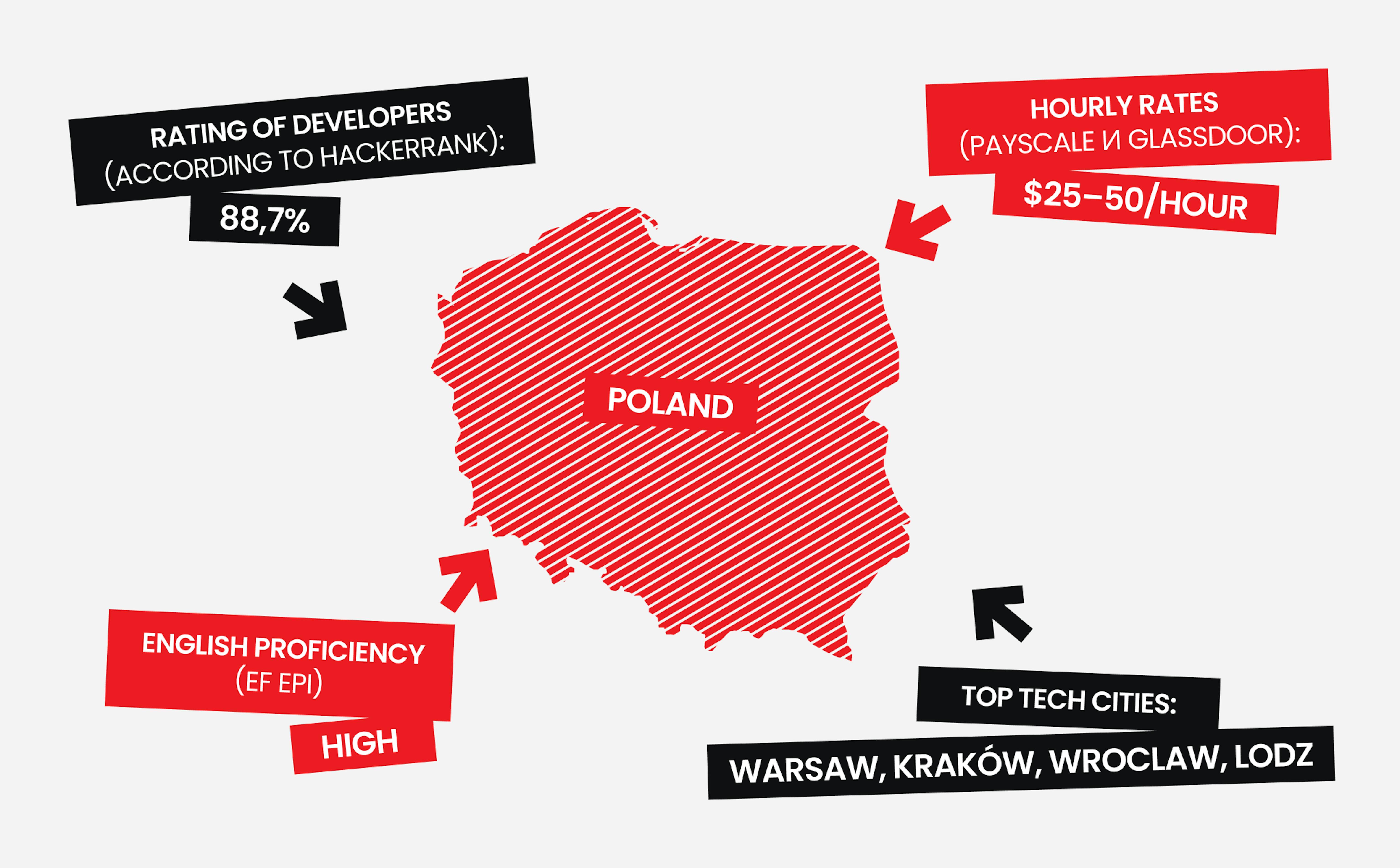
According to statistics released by the website HackerRank, Poland is the third-largest country in the world with the most experienced programmers. Most of the local experts use PHP as their preferred programming language. Other popular programming languages such as Ruby, Java, and Python are also commonly used by local experts. Poland is also known to be a popular destination for students who are interested in learning more about computer technologies.
India
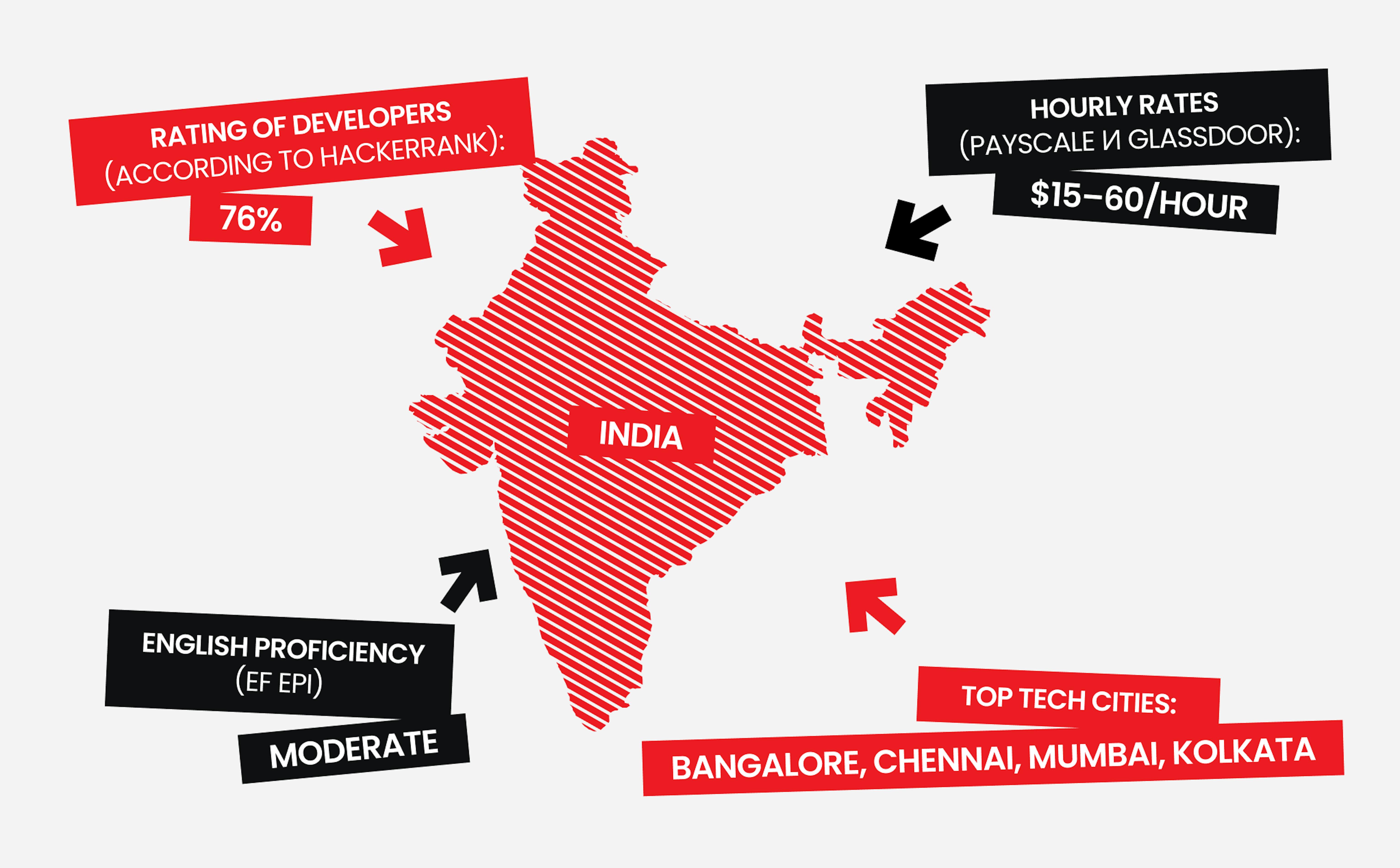
One of the main factors that attracted many companies to India was the country's skilled tech workers. There are various areas of development that are related to Microsoft technology, such as open-source projects that use artificial intelligence and blockchain.
Despite the low level of literacy in the country, the government still focuses on the development of technologies and mathematical research. Over the years, India has introduced a variety of programs designed to encourage students to pursue careers in science, technology, and engineering.
Philippines
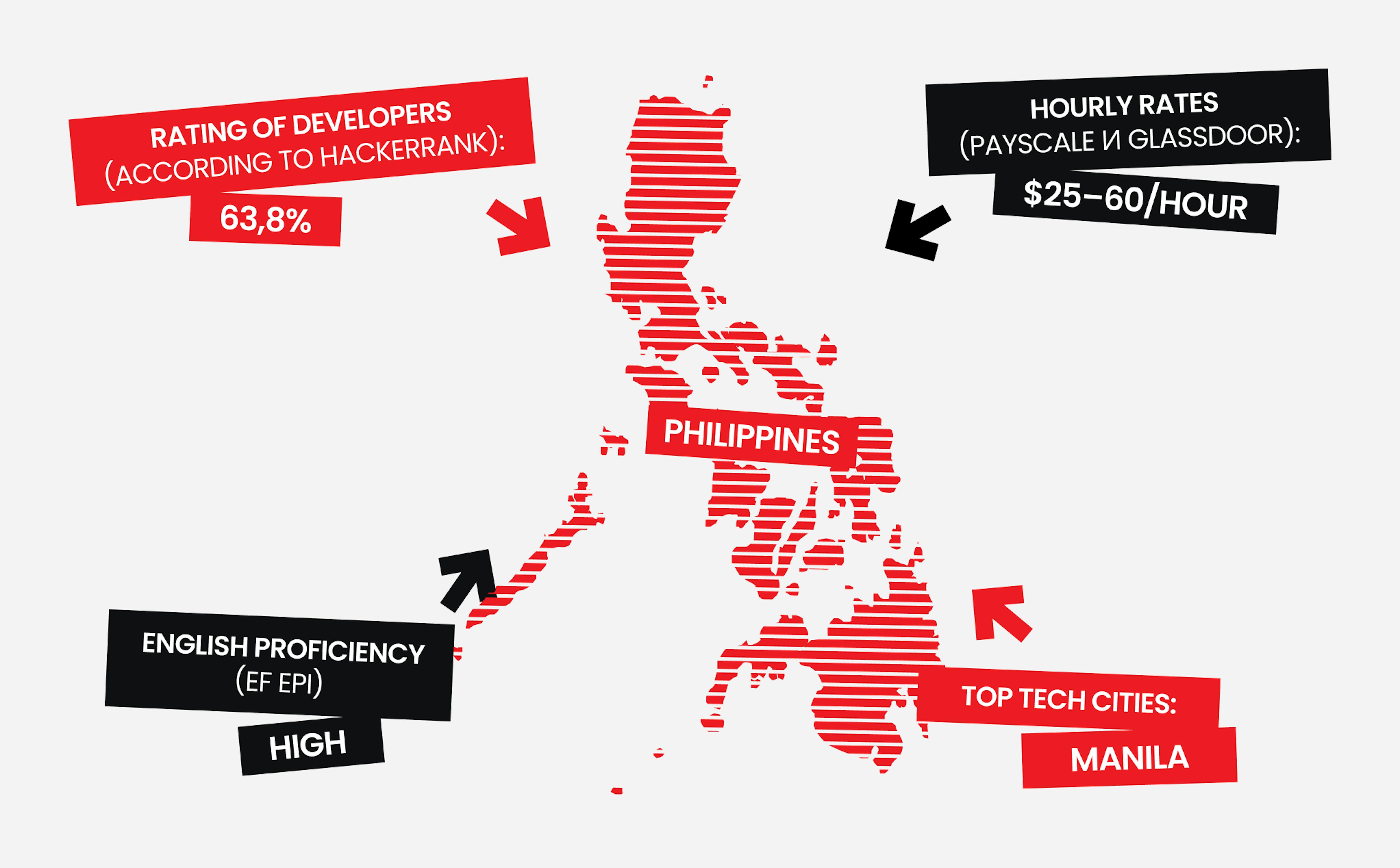
The country's skilled tech workers are known for their technical skills and fluency in English. They are also reportedly more likely to work faster than their counterparts in other Asian countries. The Philippines is also known for its tech-savvy contractors.
Taiwan
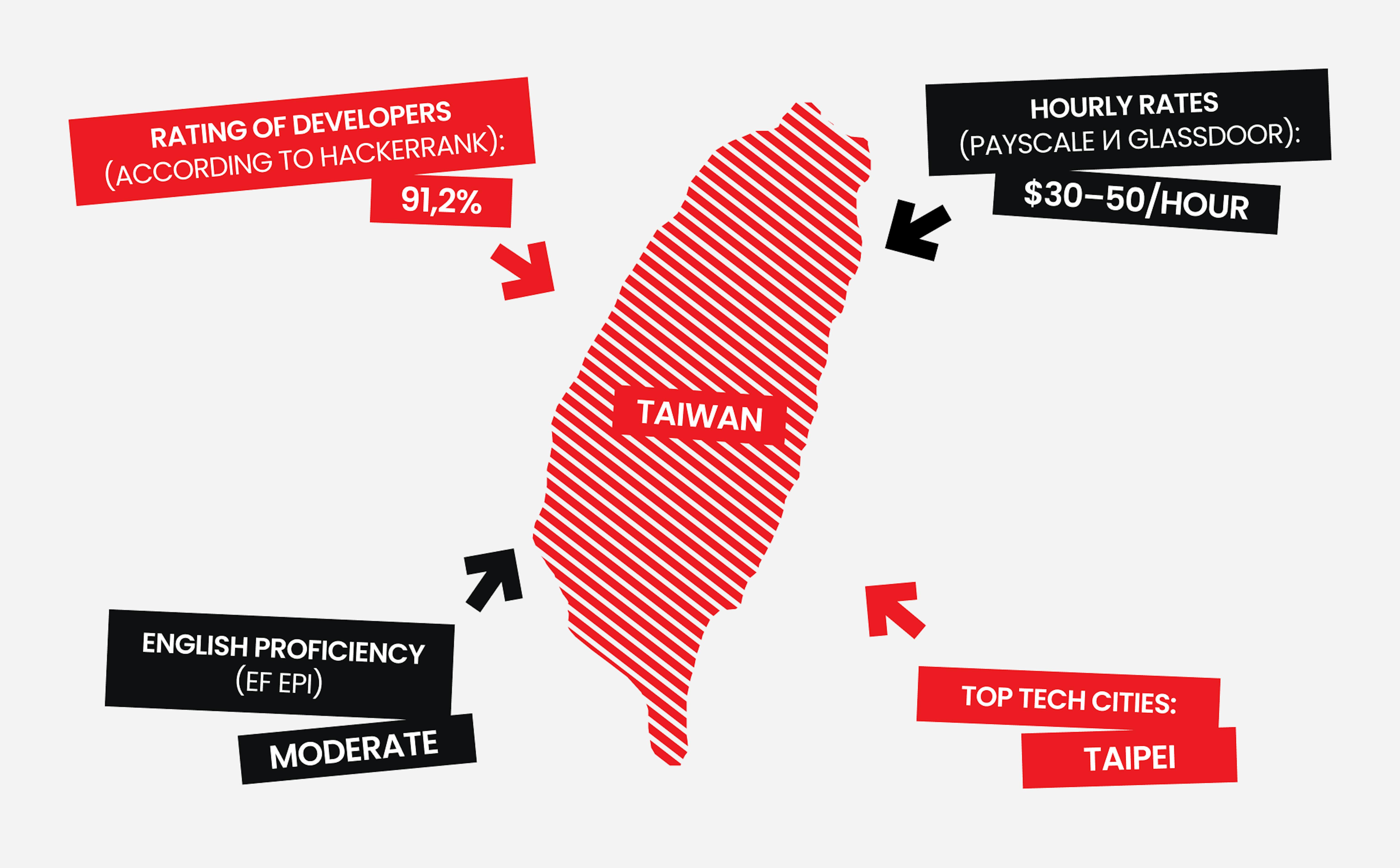
The government of Taiwan has been working toward establishing an Asian Silicon Valley. In 2020, it was introducing STEM education in order to encourage more students to pursue careers in science, technology, engineering, and math. The country's skilled tech workers are also known for their hard-working spirit and higher quality of work. Due to the government's efforts, Taiwan has become one of the most prominent technology countries in the world.
Czech Republic

The Czech Republic is also known for its low taxes, favorable business environment and ability to attract international companies. Due to the low taxes, the country is expected to become one of the most prominent outsourcing locations in the world in 2022. There are also over 150 thousand software professionals in the country annually. The country is also known for its skilled tech workers and the development of various software products, such as the Google analog - Seznam - and the anti-virus software known as Avast. Developers in the Czech Republic are also working on projects such as Euro Truck Simulator and ARMA: Armed Assault.
Singapore
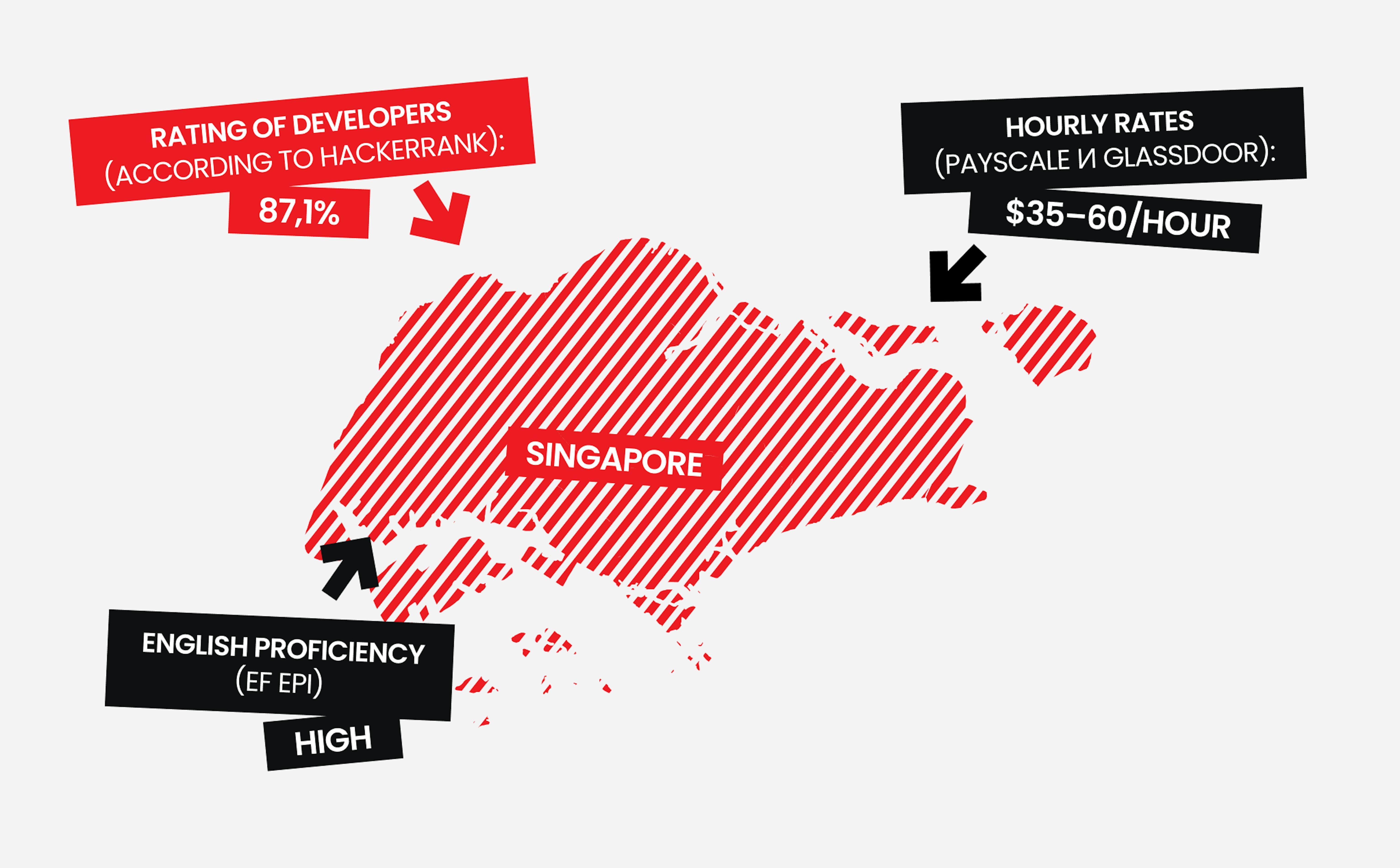
The country's skilled tech workers are known for their ability to develop projects related to the manufacturing, financial services, and public sector sectors. IT services are mainly focused on working with cloud technologies - data center migration and expansion, hybrid cloud, and cloud computing.
Romania
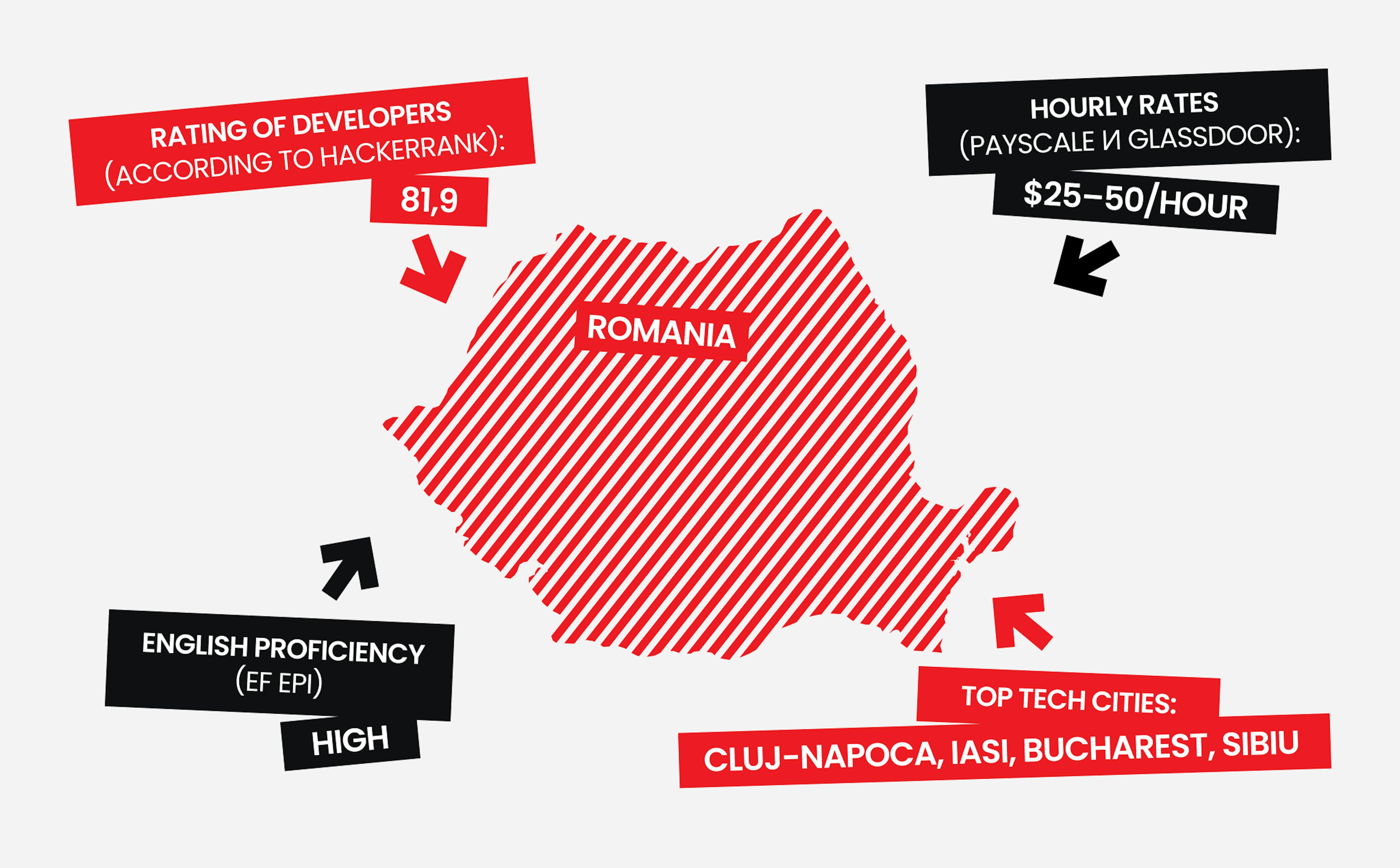
Despite the relatively small outsourcing market size in Romania, the country has 116,000 skilled tech workers. Due to the increasing number of skilled tech workers and the quality of education provided by the country's various universities, Romania has become an attractive outsourcing destination.
One of the country's high-profile software companies is UiPath, which is a unicorn that's among the top 10 software firms in Romania. Other prominent software firms operating in the country include Amazon, Intel, and Microsoft.
Top 5 reasons to outsource software development in underdeveloped countries
Offshore companies offer customers necessary and sometimes unique opportunities that are unavailable or incomparably expensive in developed countries.
1. Access to world-class talents
Due to the high cost of hiring skilled developers in Western Europe and the US, many companies are now preferring to outsource their software development. This is done by hiring a team that is based in another country. Usually, an offshore development team is hired when the client is in a country that has several time zones away from the facility. It's typically when companies from California or the UK hire developers from Ukraine or India. Due to the global pandemic, the lack of borders and distances has opened new horizons for the digital transformation industry. Many companies are now realizing that remote workers can be more productive and efficient than they would be if they were based in the country.
2. Cost saving
One of the main advantages of outsourcing is that it can reduce the cost of hiring a team. why American leading software companies often outsource software development to other countries? The average cost of hiring an offshore development team for a software project in these regions is more than $100 an hour. This is significantly higher than the average cost in India, Ukraine, for example.
Aside from being cheaper, outsourcing can also provide you with a better solution when it comes to meeting your core business needs. In-house hiring is also usually more expensive than offshore outsourcing. Aside from the cost of office space and employee benefits, you also need to pay taxes and other fees.
3. Time-saving
Getting started with an offshore development team is also easier than ever. With an outsourcing partner, you can find the right talent for your project and start working on it immediately. The team members are usually equipped with all the necessary equipment and software to carry out the work.
Aside from being able to sign up the team members, it's also easier to establish a communication relationship with them since they have worked together before. If you still want to hire in-house, but need to start working on a product development project, then go for a temporary solution.
4. Modern technologies
One of the main advantages of outsourcing is that it can provide you with a competitive advantage by allowing you to access world-class technologies. With an offshore development team, you can get the latest software and agile methodologies, which can help you deliver a smooth and effective end-user experience.
It's also important for small and medium-sized enterprises (SMEs) to outsource their software development to a company that can provide them with the expertise and resources to develop new products to mitigate risks.
5. Support
Aside from the process that you have to follow, software development also involves continuous support and maintenance to ensure that it's error-free and performs better. This is why outsourcing the process of software development can provide you with exceptional support and maintenance services.
To wrap up
It can be very challenging to find the right offshore software development company, but it's possible. There are a lot of subjective ratings and descriptions available, but knowing what to expect can help you make an informed decision. Before you start working with a company that outsources software development, you should consider some of the most important factors are the cost of doing business, the quality of education, and cultural differences. So far, according to the provided list above, Eastern Europe is a great choice for choosing offshore software development countries since it has an average developers rate and provides companies with an experienced engineering team.
















